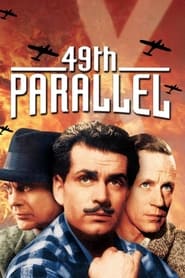Can you think of a year in history other 1941 where a film could include German soldier exclaiming, "Think yourself lucky we don't burn you too!" without it either being early and thus a little too strong, or, of course, the threat having a completely different meaning altogether? Indeed, without Anton Walbrook and Laurence Olivier (and with the latter's "outarageouseley bahd Frensch Canahdian ackercent!"), this would be a bit of a slog, even with everything that makes it a time capsule of a unique moment history. For instance, it's shocking to hear the United States referred to as a "neutral power" as if it were some kind of Liechtenstein or San Marino on the Atlantic, and not because how anti-German the US would soon become. Beyond that, though, the film serves as a good reminder about just how much anti-Nazi propaganda at the time revolved around demonising Hitler and friends on the grounds that they were dangerous "gangsters", rather than a new and different kind of enemy. This is perhaps a broader reminder that we must perforce reach for existing and (likely) misleading allusions when dealing with new concepts — which is itself possibly informative in contemporary debates regarding whether the word 'fascist' can be applied to a certain political actor or not.
The film is torn between portraying Canada as evincing both a friendly, "aw, shucks" provincial charm that wouldn't (or couldn't) hurt a fly, whilst also wanting to position the country as an absolutely vital part of the Allied war effort that somehow powerfully bestrides the world stage in its own way as well. Indeed, on this question of maple-washing, 49th Parallel's explicit claim that the country is a haven for immigrants or Indigenous peoples (a land of "security, peace and tolerance and understanding") seems utterly convincing when coming from Anton Walbrook, but it flies somewhat in the face of historical reality, both pre- and post-WW2 if I remember my Hannah Arendt and modern news reports correctly. And it's not surely not credible that there were no elements of the far-Right in Canada in 1940, let alone factions of the center-Right who would be sympathetic to making common cause with them for strategic ends?
No, the sad truth is I'd probably believe anything if Walbrook said it with such force and feeling as he does here, even joining his weird bread cult in the middle of the countryside. What a fantastic bravado performance, and it's only its content that prevents this speech from being listed up there next to Chaplin's famous oration in his The Great Dictator (1940), surely the most famous intra-war propaganda speech in cinema after Walbrook's other one in The Life and Death of Colonel Blimp (1943).
Synopsis: In the early days of World War II, a German U-boat is sunk in Canada's Hudson Bay. Hoping to evade capture, a small band of German soldiers led by commanding officer Lieutenant Hirth attempts to cross the border into the United States, which has not yet entered the war and is officially neutral. Along the way, the German soldiers encounter brave men such as a French-Canadian fur trapper, Johnnie, a leader of a Hutterite farming community, Peter, an author, Philip and a soldier, Andy Brock.

